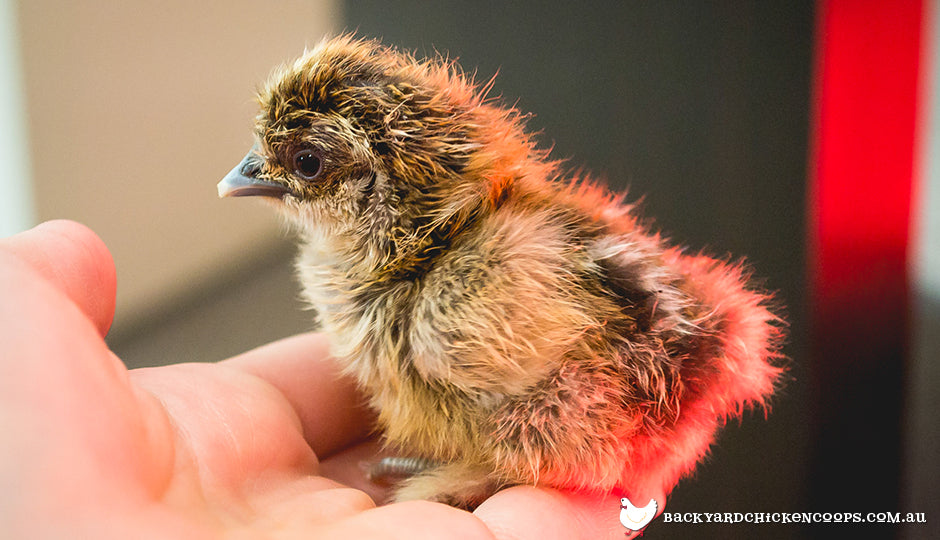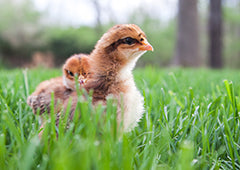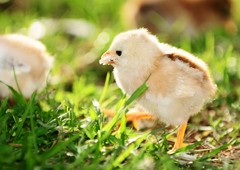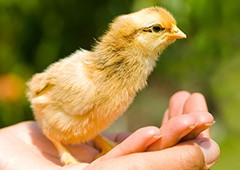It’s a beautiful moment the day baby chickens arrive into the world - whether its via our own hatching activities or through buying them. Sometimes, baby chickens can be faced with health obstacles on the road to full growth - most of which can be rectified with proper care and treatment.
Here are some common problems that may affect your baby chicks, and how to go about setting them back on the path to happy, healthy adulthood!
Pasting Up
‘Pasting up’ or ‘pasted vent’ is a common problem that occurs with baby chickens, where a build up of droppings can block their vent opening
What it’s caused by:
- incorrect incubator temperature
- a result of something they’ve ingested
- excess stress
Untreated, pasty butt puts baby chickens at risk of:
- infection
- serious damage to their bowels
- potential death if nothing is done
How to treat it:
Put some warm water on a washcloth and gently wipe the baby chickens’ vent until all the visible, dried droppings are gone. It is crucially important to be gentle as the vent can be damaged if too much force is used.
Splayed Legs
Also known as spraddle leg. It’ll be pretty easy to tell whether a baby chicken has splayed legs - their legs are stretched out on either side of their body instead of underneath like normal.
What it’s caused by:
- an overcrowded brooder
- incorrect temperatures during incubation, warping development
- problems during hatching
- lack of proper nutrients
Untreated, splayed legs put your baby chickens at risk of:
- they’ll be unable to walk properly or function as a normal chicken - their quality of life will be severely impacted.
How to treat it:
Early detection is key - the quicker you start treatment, the more likely the bones will heal properly.
Wrap a band-aid or some other firm material around the outside of the two legs in a loop - in essence binding them closer together. Keep this on for a few days while the legs adjust to their proper positions. It’s important to monitor the chick to ensure they’re still able to access feed and water.
Sometimes splayed legs can be prevented by covering the floor of the brooder with strips of white paper towels instead of shredded materials, while their legs are growing stronger.
Unfortunately, not all cases of splayed legs can be fixed - at which time you should consider your options based on the quality of life the chicken will have.
Twisted Neck
Also known as stargazing and wry neck. This occurs when a baby chicken cannot hold its neck up properly, with its head falling upwards onto its back, forcing it to look upwards - hence the term ‘stargazing’. Baby chickens with twisted neck are physically unable to walk normally.
What it’s caused by:
- genetic abnormalities
- vitamin/mineral deficiencies
Untreated, stargazing puts your baby chickens at risk of:
- Your baby chicken will be unable to walk normally without falling over constantly, which greatly impedes its ability to undertake any sort of normal chicken activities.
How to treat it:
Administering vitamins to your chick can sometimes cure twisted neck. Some chickens may bounce back in a matter of hours, some may take weeks. Baby chicken owners have had success giving their baby chickens the following substances:
- Vitamin E with selenium (most important)
- Water soluble multi-vitamins
- probiotics and electrolytes
Consult your vet or poultry professional for more information, and make sure you follow dosage directions on any vitamins or supplements you purchase.
Scissor Beak
Also known as crossed beak. Scissor beak is where a baby chickens’ top and bottom beaks don’t line up.
What it’s caused by:
- Scissor beak is a genetic deformity. It is highly recommended that no chickens with scissor beak are used for breeding.
Untreated, scissor beak puts your baby chickens at risk of:
- Scissor beak is a condition that gets worse over time - depending on the severity of their deformity, they may have serious difficulties accessing their feed.
- Sometimes the other chickens will prevent the bird with scissor beak from reaching the feed, so they need to have a separate feeding area that only they can access.
How to treat it:
- adjustments can be made to the feed to make it easier to eat - moistening it, or raising their feeder to around the baby chickens’ shoulder level makes it easier for them to access.
- having a separate feeder for the scissor beak chicken helps ensure they aren’t blocked from access to food.
- if the case is severe, sometimes the only solution is surgery
Respiratory Problems
Coughing, sneezing, heavy breathing, runny noses...sometimes the fix for these are simple adjustments to their environment. Other times they can be symptoms of something more serious.
What it’s caused by:
- dust in the brooder
- using very fine cedar shavings for bedding
- brooders that haven’t been cleaned properly
- potentially symptoms of more serious diseases (in which case you should consult your vet).
How to treat it:
- ensure that the brooder is thoroughly cleaned before putting the baby chickens in there.
- abstain from using cedar shavings as bedding
- use natural ingredients such as white vinegar and water to clean the coop instead of harsh chemicals - the fumes can be toxic to the baby chickens
- add herbs to the brooder, scattered around fresh or finely chopped into their feed: basil, dill, thyme. Check out our Herbs for Hen Health series for more information.
- Lightly squirt a chick with a salt water solution
Again, if the symptoms don’t clear up, consult your vet as it may be symptoms of an illness.
Many baby chickens grow into healthy, happy adults without any hitches - so don’t be deterred by all these intimidating terms and ailments!
Many of these problems can be prevented by having a decent brooder/incubator (if you've hatched your own chickens), that can easily be programmed to stay at the right temperature for your baby chickens, helping them develop and grow as they should.
It's an eggciting time that can also be fairly overwhelming! We all know just how quickly these little ones grow up so you are going to want to make sure that you've got the knowledge you need to raise a happy, healthy flock. You wouldn't want to risk making tragic mistakes that could impact their development, growth or worse!
67% of chicken keepers surveyed experienced a chicken health or behaviour issue in the first 12 months that they didn’t know how to handle. This is why I highly recommend that you check out our friends at Chickenpedia. Their Raising Baby Chicks course provides lots of valuable information to help you avoid any life-threatening accident. You'll have all the confidence to give your feathered friends the best start in life.
Get access to all of the best chicken keeping courses at Chickenpedia.
If you have any questions, leave a comment below and our eggsperts will reply. We look forward to chatting with you.



















